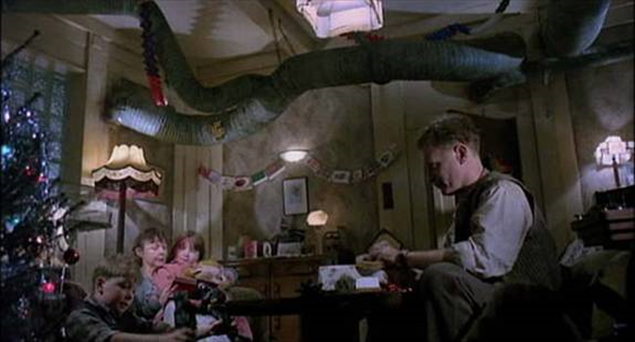In 1985, Terry Gillam wanted to direct a movie to bring the audience an outstanding visual experience of science fiction through the use of black comedy. This was the creation of Brazil.
What was Brazil? Well, Brazil is a film that explores the future through the use of visual effects associated with science fiction, exploring social and political themes through the usage of technology. It is about the story of Sam Lowry and how he escapes this dystopian world
The movie at first often felt lacking as the scenes were at times confusing and some overlapped making it harder to understand what was going on in that scene. However, the true beauty of the film is revealed once the audience understands the deeper meaning behind each scene. This is when Brazil becomes a masterpiece.
Freedom:

The opening scene of Brazil begins with an advertisement for air ducts, however, this piece of imagery reappears constantly throughout the movie, these ducts were first introduced to us in the Buttle’s house and the rusty looking contraption hangs over them somewhat setting the idea that these ducts are somehow more dominant. In the movie, several scenes also include these ducts from the house of the rich and poor to government buildings. Looking at these objects in a metaphorical term, these ducts represent the totalitarian government that seeks to control society. The advertisement reads, “new duct designs are now available in hundreds of different colours to suit your individual tastes.” This line gives the society a false sense of choice as they are only allowed to pick the colour, Central Services one of the main components of the government are the only ones authorized to service them. People who tamper with these rules are branded as a terrorist like Tuttle.

Another example of the theme “illusion of choice” is when Lowry joins his mother and her friend at a fancy French restaurant. The server asks the guests to pick different options but when the food is served they consist of the same scoops of green mush. This shows how choice is seen in a superficial way and that “freedom” in Brazil is just a lie.
Dehumanisation:

While interviewing the deputy minister of information retrieval, he only refers to the terrorists as bad sport hinting that he has no interest in stopping any of these events and tells society to just move on. Bureaucracy in this world has tainted human morals as in the scene of Buttle’s arrest, the officers have no sense of sympathy barging into the house, breaking almost everything in sight and showing no sign of remorse to the children.

The protagonist, Sam Lowry isn’t the typical hero you see in most movies but is rather a product of what totalitarian society does to a man. Lowry doesn’t act because he sees the truth of his society but rather to benefit himself. We see this is the scene in the restaurant where he continues to eat while other civilians are left to die or are currently dying and when asked what he was going to do he simply replies with, “I’m on my break” or using the excuse “Not my department, not my fault” when talking to the family of the false arrest. This theme becomes very obvious when he is tracking down Jill as even though he loves her he doesn’t treat her like a fellow human, often ignoring her ideas and trying to take matters into his own hands.
Fantasy:

One of the main themes that are quite obvious is escapism. Society as a whole is trying to escape from this dull world as instead of working many people watched movies or films and pretended to work when the boss was around. Throughout the film, we see Lowry distract himself from the real world through fantasy as he soars through the skies, finds the love of his life and slays monsters and samurais.

While chasing his dreams, he is caught in a dire situation where his actions began to become backlash, affecting not only himself but Jill. The ending scene shows Lowry driving off into the distance with Jill however, in reality, she has been killed while he was branded a terrorist and tortured. He his seen humming the song “Brazil” obvious that he has gone insane and the final line delivered to the audience was, “He’s got away from us, Jack… I’m afraid your right.” This line shows that Lowry did successfully escape and is now living in a permanent daydream.
Deception:

Deception plays a key role in the film as it is entirely based around this theme. The meaning of the film has also deceived the audience. The film sells itself as a futuristic world, however, this isn’t the case as Terry Gillam quotes, “Those films are not really about the future […] I think both films were really about the present, which I tried to disguise with some future elements.”
The film portrays this element beautifully as the audience isn’t aware of the situation until the movie finally reveals the larger picture, slowly revealing it until the audience is finally aware of what was happening. An amazing example of how the film uses deception is the scene where Lowry is escaping with Tuttle and newspapers start flying around him until he disappears. This scene not only revealed to be apart of Lowry’s imagination but contains a bigger metaphor behind it. Earlier in the movie, when Tuttle was fixing Lowry’s heating system, he is quoted saying, “I couldn’t even turn on a kitchen tap without filling a 27b/6, bloody paperwork.” He expresses his hatred towards paperwork believing that they are unnecessary and consume too much time. I believe that this scene represents how Tuttle was literally buried in paperwork until there was nothing left.
Bibliography:
http://mentalfloss.com/article/72844/13-fascinating-facts-about-brazil
